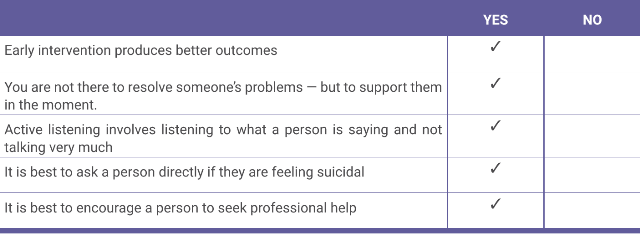Questions & Answers
in /by Debbie Swibel
Questions & Answers
Fear, shame, guilt, unaware, denial, stigma, no resources, no support .
Biological, psychological, environmental.
Grief & loss, trauma, stress, illness.
Changes in hygiene and dress, laziness and lethargy, withdrawal from family and friends, avoidance of going out, overuse of alcohol, medication or drugs, cessation of usual enjoyable activities, inability to accomplish things at work, home, university, school or sport, inability to concentrate, sadness, thoughts of hopelessness and helplessness, guilt, irritability, indecisive, disappointed, miserable, lacking in confidence, angry, overwhelmed, frustrated, anxious, loss of appetite, changes in sleep patterns, tired and lethargic, depressed, headaches, run-down, lack of sex drive, unable to move or get out of bed.
Often appear scared, worried, on edge or nervous, difficulty concentrating because of fear or worry, often worry that something bad will happen, avoid doing things because of anxiety, changes in hygiene, unable to complete tasks, withdrawal from family and friends, avoidance of going out, overuse of alcohol, medication or drugs, cessation of usual enjoyable activities, very worried or afraid most of the time, nervous or scared, tense and on edge, panic, everything is going to go wrong, ‘I might die’ ‘I can’t handle the way I feel’, ‘I can’t focus on anything but my worries’, ‘I don’t want to go out today’, ‘I can’t calm myself down’, ‘I can’t take this anymore’, ‘I’m going to have a breakdown’, sleep problems (can’t get to sleep, wake often), racing heart, pounding heart, rapid breathing, sweating, shaking or trembling, pins and needles, twitches, tummy aches, light headedness, churning stomach, dizziness, butterflies in stomach, burst of energy.
Talking about suicide and wanting to act on suicidal thoughts, trouble eating or sleeping, experiencing drastic changes in behaviour, withdrawing from friends and/or social activities, losing interest in hobbies, work, school, giving away possessions, preparing for death by making out a will and final arrangements, attempted suicide previously, taking unnecessary risk, recent severe losses, preoccupation with death and dying, losing interest in personal appearance, increasing use of alcohol or drugs, sense of isolation or feeling alone – ‘no one understands me’, a sense of hopelessness or no hope for the future, aggressiveness and irritability – ‘leave me alone’, possessing lethal means – medication, weapons, negative view of self – ‘I’m worthless’, drastic changes in mood and behaviour, self-harming behaviours, frequently talking about death – ‘if I died would you miss me?’, feeling like a burden to others – ‘everyone would be better off without me’, feeling exhausted — ‘I can’t go on anymore’, ‘I can’t do this anymore’ ‘it’s all too much’, substance abuse, talking about suicide – ‘sometimes I feel like I just want to die’.
building resilience, practising gratitude, taking time to self-care.
Healthy diet, regular exercise, enjoyable activities, regular sleep routine, self-awareness, recognise your feelings, talk about how you are coping (or not coping) with your emotions, relaxation and reflection, talk about your feelings, it’s ok to say “no” to extra responsibilities in your life, set goals, making time for friends and family, make time to socialise, peer support from other colleagues, professional development, balance your workload, take lunch breaks away from your desk, mindfulness, meditation and yoga, gratitude.

